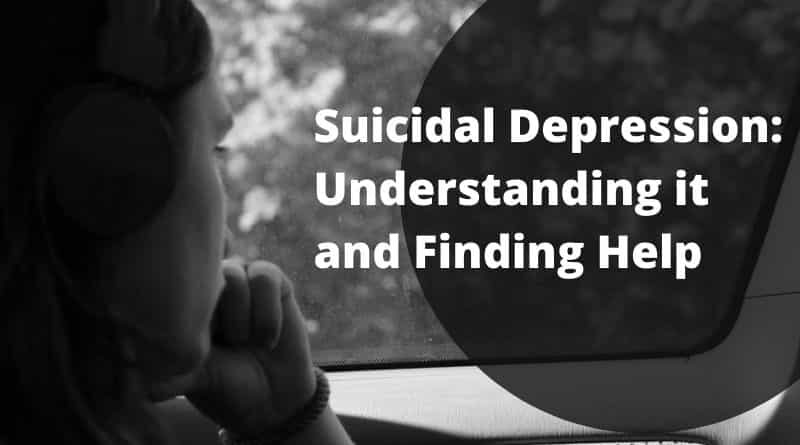Suicidal Depression: Understanding it and Finding Help
Depression is a mental health disorder generally characterized by constant feelings of sadness and loss of interest in what you once found enjoyment in. It is different from the mood fluctuation that people regularly feel.
Table of Contents
What can be the causes of depression?
There can be many causes of depression here is a list of some of them:
- Abuse – Physical, sexual, or emotional abuse can cause you to be depressed later on in life.
- The loss of a loved one
- Serious illness
- Substance abuse
- Age – some elderly people are at a greater risk for depression.
- Medication – certain medications can increase your chances of becoming depressed
- congenital, people with a family history of depression have a greater risk of becoming depressed
What is suicidal depression?
Suicidal depression is not a clinical diagnosis per se but a term that mental health professionals use to refer to a depressed person with suicidal thoughts. When a person is clinically depressed with suicidal ideations as one of their symptoms, this can mean that they are experiencing suicidal thoughts as part of their overall mental health condition.
It is important to be mindful that suicidal thoughts can occur outside of a clinical depression – thoughts of suicide can occur with other mental health conditions such as anxiety, post-traumatic stress disorder, and even substance abuse.
Read: What Does Teen Depression Feel Like?
How is suicidal depression treated?
There are many different ways to treat clinical depression with suicidal ideations. One of the factors to take into consideration is severity. Once depression symptoms lessen through treatment, some people may see a decrease in their frequency of thoughts of suicide. This is not the case, however, for everyone. One of the key factors that need to be put into place is to make sure that the individual suffering is in a safe environment.
Finding an excellent mental health facility is essential. It is also important to find the route of this condition. As mentioned before, there can be several causes. Treatment is key. If you find that your loved one is also suffering from a substance abuse problem, finding a suitable treatment facility that handles “due diagnosis” is the way.
Treatment:
The treatment for suicidal thoughts and behaviors depends on each specific situation, the level of suicidal risk, and the underlying problem that led you to the suicidal thoughts. In an emergency, calling 911 is the answer.
Treatment in a non-emergency situation
If you or someone you care about has suicidal tendencies but is not in a crisis, other options are available to you. Some of these treatments can include:
- Psychotherapy – this type of therapy generally takes place with a psychologist. You explore and introspect about the issues that make you feel suicidal and are given skills to help manage your emotions more effectively. You and your therapist work together to put a treatment plan into effect while setting goals.
- Medication – there are many medications that you can take to help with your mental illness. There are antidepressants, antipsychotics, and anti-anxiety. These taken correctly can help reduce your symptoms and feel less suicidal.
- Addiction treatment – treatment for a drug or alcohol addiction can include detox, inpatient addiction treatment, and self-help group meeting. Depression sometimes goes hand in hand with substance abuse.
- Family support – sometimes, your family can be a good source of support. Getting your family involved with your treatment will help them better understand what you are going through and give them coping skills. It can also improve family communication and relationships.
Read: Management Tips for Depression
Once your depression is under control it is very important to manage it. Here are some suggestions to help keep it under control:
- Medication management – it is very important to continue to take your medication as prescribed even if you start to feel better. Stopping on your own can lead to your depression returning.
- Diet and exercise – eating a healthy diet and exercising can make a significant difference in how you feel. Eating a healthy diet can make your body feel good. Exercise helps your body release endorphins and helps improve your self-esteem.
- Illegal substances – if you have depression, it may be tempting to have a drink or to use drugs as a coping mechanism. This may improve your mood immediately, but the long-term results will be a return to depressing feelings and possible suicidal thoughts.




